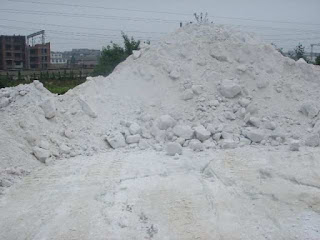Financial aspects of comminution in beneficiation plant
The cost
of comminution operations is typically a very significant proportion of the
total cost for mineral processing. Comminution costs are conveniently divided
into two parts: Capital costs (the original cost of equipment and its
installation) and operating costs (the day-to-day costs associated with power,
wear parts, maintenance, and labor provided by operators).
Typical
capital costs are shown in Tables 1 and 2 for a copper ore and an iron ore processing operation,
respectively. The total investment cost for the copper crushing and grinding
plant is about $48.8 million. The total investment cost for the iron ore
crushing and grinding plant is about $54.2 million.
It should
be kept in mind that the hardness of these two ore types differ by 113% and
that the final product size of each is different. Copper ore product size
required for flotation is about 80% passing 100 mesh, whereas the iron ore size
required for making iron ore pellets is approximately 80% passing 270 mesh.
Note that in each case the installed cost is roughly 1.5 times the equipment cost.
The installed cost includes foundations, buildings, wiring, and basic
regulatory controls. In addition, the cost of equipment varies roughly as the
size reduction effort; that is, it must deliver the cost of the maximum power
it is capable of drawing during breaking operations.
Finally,
operating costs vary with comminution device type, ore type, feed size and
product size, local energy and labor costs, media and wear protection materials
used, and equipment operating modes and maintenance programs. Typical copper
and iron ore costs are presented in Tables 3 and 4.
A more
general division of operating costs is shown by equipment type in Figure 1.
Note that the relative costs for energy and wear parts, liners and grinding
media are different for different ball mill
types.
When
taken in total, these costs (capital plus operating) seem to be huge, but an
analysis of the net present
value (which takes into account the comminution plant revenue minus operating
costs discounted
to their current value) of a comminution operation for a 10-year period for an
85,000-tpd copper
ore operation and a 25,000-tpd iron ore operation in 2001 in North America, for
example, predicts
profitable performance. As long as the metal values of the ores are high enough
and the overall finenesses
of the product required for separation are not too small, the overall economics
of comminution will
always be quite favorable.





评论
发表评论